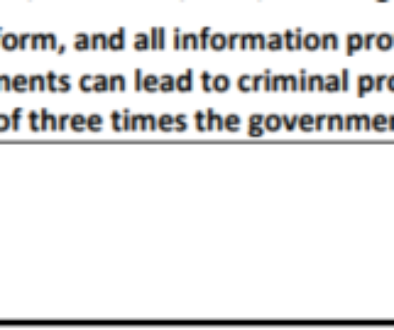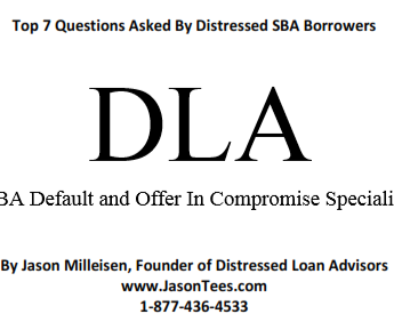Greetings! My name is Jason Milleisen, founder of Distressed Loan Advisors. Since 2009, my clients have have over $100 Million forgiven as a result of my advice.
If you are looking for answers to your SBA loan default questions that you can’t find within my 200+ articles, you can schedule a case evaluation here. I also have a SBA Default Podcast. Now, on to the article…
I once got a call from a guy who stated he was looking for an attorney. When I told him that I am not an attorney, but rather a former SBA workout officer, his response was “Oh, well thanks, but we really need an attorney.”
I went on to question him about his situation, and he told me that he was 3 months late on him SBA loan, and the bank had not granted him a modification.
“So, why do you feel that you need an attorney to help with a modification?” I asked.
“The bank has threatened foreclosure.” he responded.
Look, I get. It’s a stressful situation, and I can appreciate the urgency. But it doesn’t mean it’s time to panic. If anything, now is the time to gather fact and make a well-informed decision. If you are reading this article, it’s a good start.
For the record, pretty much every bank threatens legal action when you don’t make payments for 3+ months. Until it actually happens, it’s all talk and an attorney can’t do anything more than I can when it comes to rectifying a default.
I knew from this guy’s tone that he had his mind made up, and no amount of explanation was going to sway him. He truly seemed to think that the bank would be intimidated if an attorney called them.
As a former banker, I can tell you that his assumption is not correct. Bankers deal with attorneys all the time, and they don’t cower in fear.
By the way, if you bring in an attorney, many banks will, in turn, bring in their own attorney. And I can tell you that when I worked for banks, the bank attorneys knew very little about the SBA Offer in Compromise process. Their job was to file lawsuits and draw up agreements. They had no clue what was involved in evaluating an OIC.
So, if you bring your own attorney to an OIC negotiation (experience or not when it comes to SBA default), it may not result in a settlement, but it will definitely result in:
- Added expense, in many cases, without any added value. You’ll essentially be paying for a very expensive game of telephone. You give the info to your attorney, they pass it to the bank’s attorney, who passes it to the bank workout officer (the banker is the one making the decisions).
- Added time. Every time an email goes out and sits in an inbox for a day or two before being forwarded on to the next stop, time is wasted.
So the question remains: When do you need an attorney?
You need an attorney when you:
- Need to be represented in court.
- Want to file for bankruptcy.
- Need to answer a legal summons and complaint.
- Are asked to sign a legal document.
You’ll notice that the above list does not include the negotiation of loan modifications or SBA loan forgiveness. Successfully negotiating SBA debt settlements and loan modifications requires the following attributes:
- Experience analyzing financial statements and cash flow analysis.
- A strong understanding of the rules of SBA settlements and loan modification protocol.
- Experience negotiating SBA settlements and loan modifications.
- An understanding of how the SBA evaluates settlement offers in the real world. There are SOPs (Standard Operating Procedures) that explain how the SBA and lenders should handle the OIC process, but only someone with years of experience knows how the SBA acts in practice. Huge difference.
While there may be attorneys who do possess the above attributes, my point here is that not all do, so to assume that you need an attorney in all workout situations is a false assumption.
Everyone Is Biased In Some Way
I know what you are thinking: Jason clearly has an interest in convincing me not to use an attorney because he wants me to hire him! True, but it doesn’t mean my points are not valid. I see it as a similar situation to when borrowers are trying to consider whether to hire me, or to hire a bankruptcy attorney. The bankruptcy attorney usually recommends filing for bankruptcy regardless of the situation. It doesn’t mean it’s not a legitimate option, it’s just one perspective.
There is no single option that is best for everyone. I always tell prospective clients to simply evaluate all their options, then make an informed decision. And that’s really the point of this article. In some cases it makes a lot of sense to engage an attorney, but in some cases it doesn’t. But to assume that an attorney is always a better option than an SBA workout consulting just isn’t true.
Final Points to Ponder
- In most SBA workout situations, the bank doesn’t involve an attorney. Instead, it’s workout officer handling the negotiations of an Offer in Compromise. When I worked for the largest SBA lender in the country as a workout officer during the Great Recession, I was running the process, and only involved an attorney when we decided to take legal action.
In other words, banks employ non-attorneys who are experts in the SBA OIC process to handle the SBA workouts. That should tell you a lot about who banks believe is more qualified to handle SBA loan default and navigate the SBA OIC process.
- The SBA has a very specific process, and not understanding that process could be a disaster. If you hire an attorney who has never handled an SBA settlement before, advice that might work for other creditors could be a disaster for an SBA loan workout. For example, I’ve had people tell me that their attorney advised them to wait as long as possible to settle after getting a 60-day letter, only to get referred to the Treasury, where settlements go to die.
- It’s All About the Paperwork. When you think of an SBA settlement negotiation, you tend to picture you and your banker in a conference room.
One says “we’ll give you $50,000!”, and the banker responds “We can’t do $50,000, but we can take $75,000”, and the borrowers pounds the table, exclaiming “$55,000 and not a penny more!”
Sorry to burst your bubble, but it’s not nearly that exciting. In fact, for the vast majority of my settlements, there is no verbal discussion of settlement amounts. It’s all done via email. Boring, right?
For this reason, negotiating with the bank/SBA is not nearly as harrowing as you’d expect. As long as you make a reasonable offer along with a pristine package of documents, you truly don’t need to pay someone to hit “send” on an email in hopes that it will intimidate the bank into approving your OIC.
Distressed Loan Advisors (http://www.JasonTees.com) offers expert advice about dealing with SBA Loan Default and Forgiveness. Schedule a case evaluation here.


